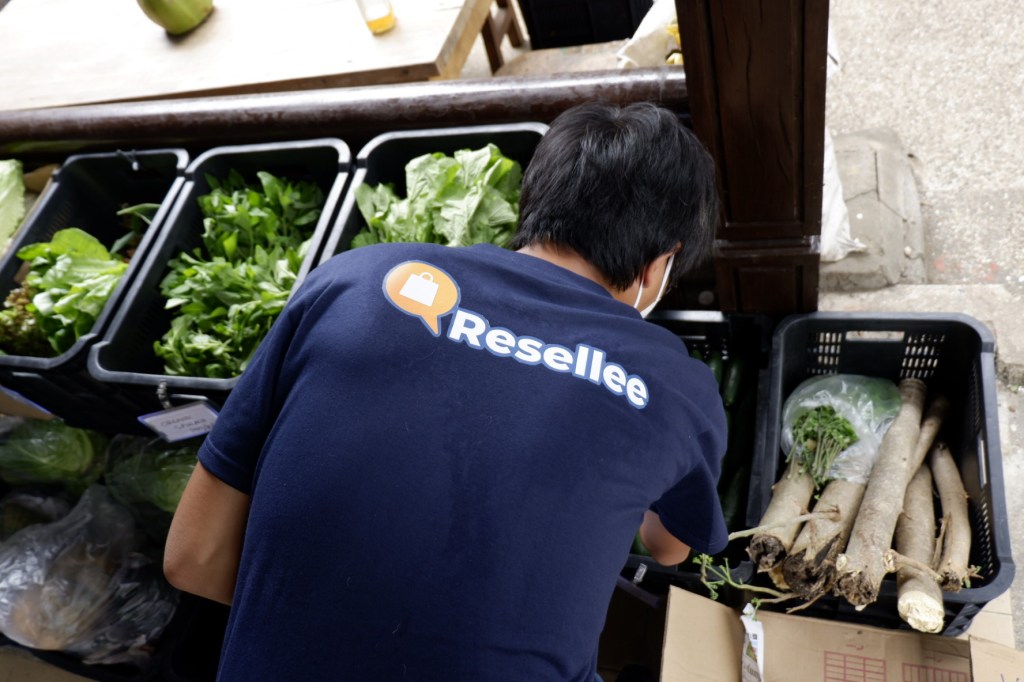Launched in the Philippines, social commerce startup Resellee wants to recreate the success of Pinduoduo, one of China’s fastest-growing e-commerce companies, in Southeast Asia. A major part of Resellee’s business is grocery deliveries, including fresh produce, and it has struck partnerships with the government and farmers’ groups to meet demand during the COVID-19 pandemic.
The startup announced this week it has raised $1 million in seed funding from Mintech Enterprises and Hofan Capital to build its technology and expand into new countries. Resellee was co-founded last year by chief executive officer Marc Concio, former head of e-commerce at Voyager Innovations, parent company of PayMaya, one of the Philippines’ largest online payment services.
Concio told TechCrunch that there are currently about 40,000 resellers on Resellee’s platform, and each has an average of about 20 buyers. Resellee sellers typically make about P5,000, or US $100, a month.
Like Pinduoduo, India’s Meesho and other social commerce platforms, Reselllee does not require sellers to carry their own inventory. Instead, it maintains a network of suppliers, including manufacturers and farmers, and lists available products on a marketplace. Then sellers chose what they want to add to their stores, which they market to potential buyers through their social media networks.
Resellee offers a wide range of products, including electronics and fashion items, but it currently focuses on grocery deliveries and prepaid credit for mobile phones and online games, which are all in high demand because of the COVID-19 pandemic.
Concio’s interest in social commerce was piqued after observing Pinduoduo’s astronomical growth in China, where it became the second-largest e-commerce company in the country less than five years after launching in 2015. Pinduoduo’s group buying model leverages users’ existing social networks, especially on WeChat, to pull together buyers for products at discounted prices, and has done well in smaller cities and rural areas.
Pinduoduo cements position as China’s second-largest ecommerce player
“Resellee hopes to learn from this and be the Pinduoduo of Southeast Asia by pioneering social e-commerce and group buying in the Philippines, then expanding to Vietnam, Myanmar, Thailand and Cambodia, where social commerce has not started yet or is still in its early stage,” Concio said.
Social commerce is well-positioned to take off in the Philippines for several reasons, he added. One is the enormous amount of time spent of social media platforms there: four hours per day, versus two and a half hours in India, and two hours in China. The Philippines has one of the youngest median ages in Asia, around 23.5 years old, and that is the demographic most likely to use social commerce, Concio said.
Another reason is that many people want to start their own businesses, or need to make side income, especially during the pandemic, but have little access to working capital. Since Resellee’s sellers don’t need to carry their own inventory and can rely on the platform’s supply chain and logistics network, that means they can launch a store without spending any money. Most of the work they need to do is convincing people on their social media networks, like Facebook or Viber, to buy from their Resellee stores.
“We believe the same hypergrowth for social commerce will happen in the Philippines given all of the above, with Resellee pioneering both social e-commerce and group buying here,” Concio said.
Resellee’s competitors include some of the biggest e-commerce platforms in the region, like Lazada, Shopee and EZBuy, which have added social commerce features. Concio said one of Resellee’s advantages is its focus on helping sellers make money, and partnerships with farmers groups and the Philippine government. This includes a project to build an online platform that will aggregate supply information from farmer’s cooperatives across the country, and match them to Resellee’s sellers and buyers, eliminating middle men in the supply chain.
Resellee initially outsourced its logistics, but Concio said its deliveries were not prioritized by carriers, which led to customer complaints, especially for fresh produce. As a result, Resellee set up its own logistics arm, called Resellee Riders, in Metro Manila, where most of its grocery customers are. This enabled Resellee to launch next-day deliveries in the area this week (orders in other places are still carried out by third-party logistics providers).
While Resellee accepts online payments, including online wallets and bank cards, most buyers prefer to use its cash on delivery option. Sellers make money through commissions, which they can transfer to their online wallets or bank accounts. Resellee’s platform also gives them the option of using the funds to buy discounted mobile or gaming prepaid loads, or top-ups, which they can also offer in their stores. Along with fresh produce, prepaid loads are one of the key parts of Resellee’s business strategy. The platform guarantees the highest commissions and discounts for mobile prepaid loads from some of the Philippines’ top providers, including Smart, Sun and TalknText.
“The mobile prepaid market is a US $4 billion annual market versus total e-commerce in the Philippines of only US $2.3 billion,” Concio said. “This is one of our key strategies to own the mobile prepaid market, other than fruits and vegetables like Pinduoduo.”
The incredible rise of Pinduoduo, China’s newest force in e-commerce






























Comment